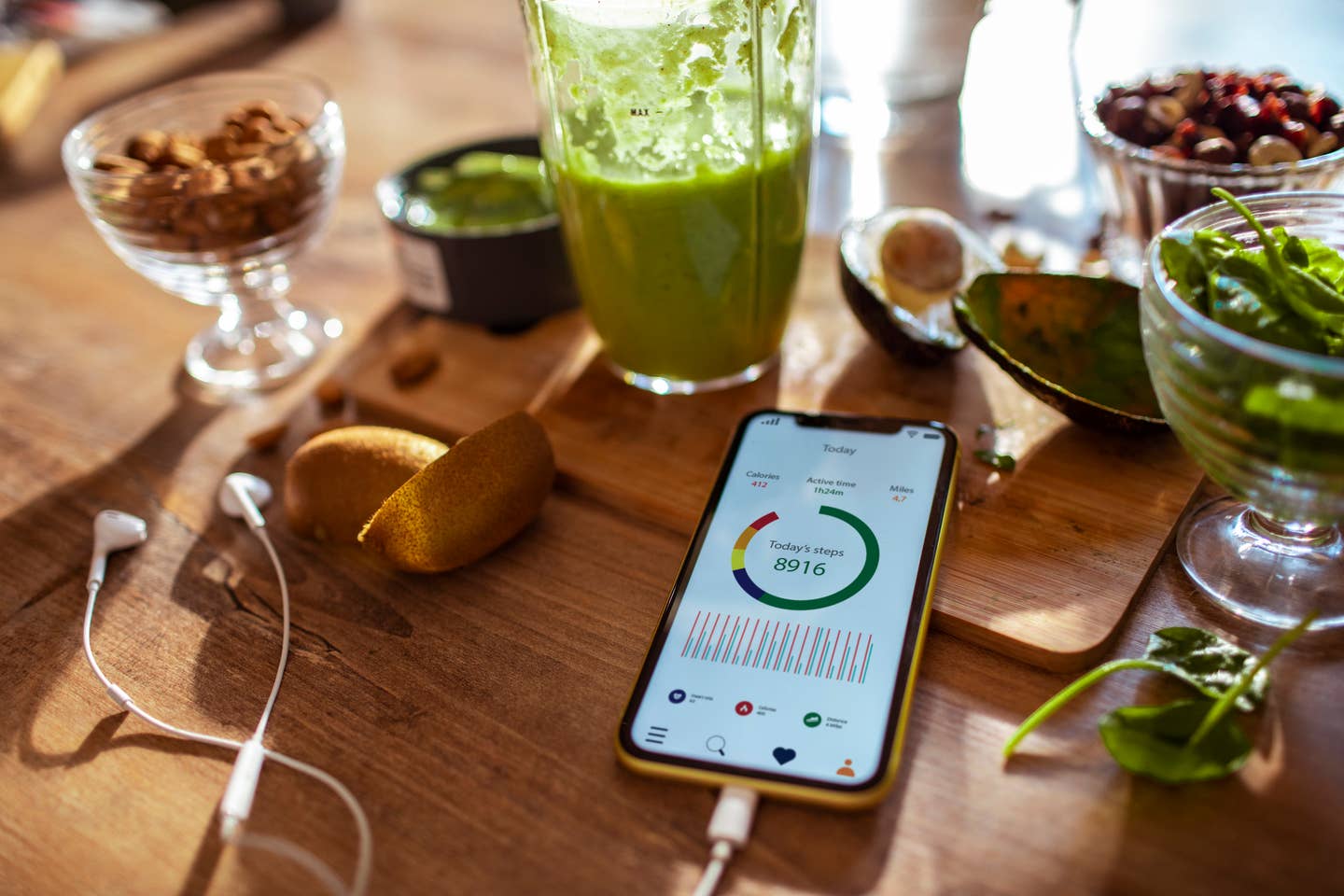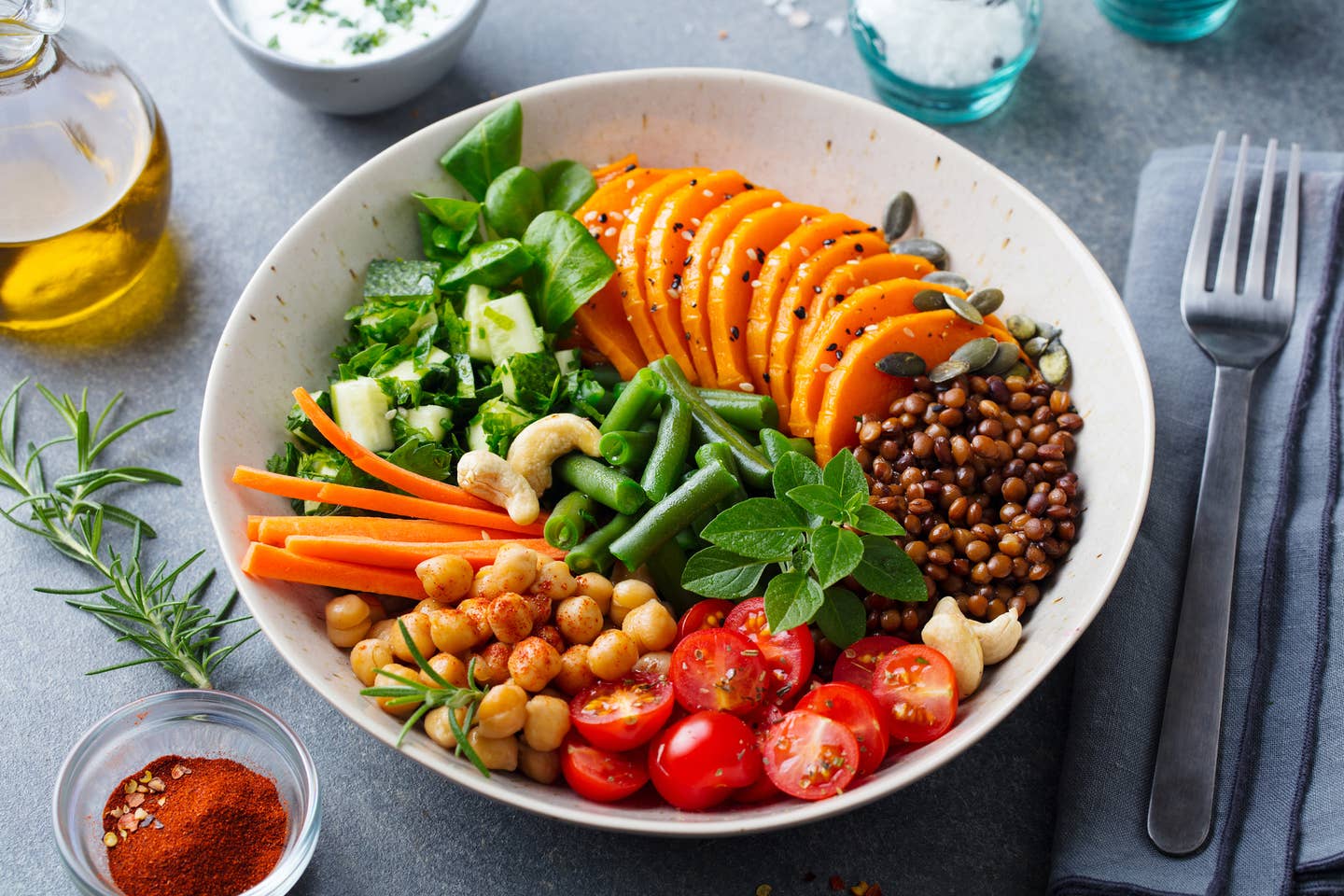
What We Can Learn from The Scarsdale Diet: 10 Secrets to Weight-Loss Success
Long before there was keto or Paleo, South Beach or Sirtfood, there was a diet by a cardiologist named Dr. Herman Tarnower, who told his patients in Scarsdale, NY that the number one thing they should do to get healthy–and avoid a heart attack–was to lose weight. He would tell them forcefully: "You must take off that unhealthy fat and flab. Go on a good reducing diet immediately." Most doctors didn't give patients diets in those days, but he did. His diet, typed out and copied on pieces of paper and shared by his patients, their tennis partners, and anyone who wanted to slim down, became a cult classic, as people lost up to 20 pounds in 14 days on the mostly plant-based plan.
The diet was high in protein, low in carbs, kept calories to a strict 1,000 a day, and people who followed it–from the half grapefruit every morning to the no alcohol every night–lost pounds fast. Testimonials famously touted sentiments like: "I've been able to stay at my teenage weight since doing the Scarsdale Diet." It took off among men and women who wanted to "stay trim" for health and wellbeing, and look and feel their best. Many of the diet's principles, such as eat as much salad as you like and avoid oils, are still relevant today.
One caveat: The Beet does not recommend such a low-calorie intake, and we believe losing a maximum of 2 pounds a week is healthier for long term results.
The first and most famous aspect: You eat half a grapefruit for breakfast every day, with a slice of protein bread (recipe below) and black coffee or tea. Even if you don't eat plant-based, the specifics of the diet are can fit nicely into your life now (other than the calorie count, which most RDs and doctors would agree is too little to sustain a healthy active lifestyle today).
The Scarsdale Diet and The VegStart Diet both Focus on Dieting for Just 14 Days
When it was published in 1978, The Complete Scarsdale Medical Diet, became a runaway hit, staying at the top of the bestseller list for months, and gaining a new morbid boost of notoriety when Dr. Tarnower was shot and killed by his jilted long-time girlfriend, Jean Harris, just two years after the book was published. The infamous crime of passion stayed on the front pages for months, and years, as the public followed the high-profile case with ghoulish fascination since both Harris (the headmistress of the Madeira School for girls) and Tarnower were well-known. The scandal made the diet more infamous, and basically over.
While other diets have eclipsed The Scarsdale Diet, many of the principles Tarnower included in his book are still effective and sound science. It teaches people to do several things that are similar in approach to The Beet's The VegStart Diet, created by an R.D., Nicole Osinga, who encourages eating a plant-based approach, full of fiber and vegetables, healthy grains and filling whole foods, for healthy weight loss. There are other parallels between Scarsdale and the VegStart Diet, such as The Scarsdale Diet instructs: Eat specific foods for 14 days at a time; prepare meals without oil or butter or other unhealthy fat; eat as many salads or steamed vegetables as you like; eat your salads undressed (other than lemon juice), and snack between meals only on vegetables like celery and carrots (The VegStart DIet offers a plethora of healthy snacks including celery and nut butter).
Scarsdale required that dieters stay away from alcohol and encouraged them to only remain on the diet for 14 days at a time, then take two weeks to maintain on a "keep-slim" plan. The biggest difference is Scarsdale tells dieters to keep calories at 1,000 while The VegStart is closer to 1,500, which is both more sustainable and healthier for long-term weight loss since you lose weight and keep your energy up and your muscle mass intact.
But rereading The Complete Scarsdale Medical Diet book, the basic principles of eating to lose weight on a mostly vegetable- and fruit-laden plan made me realize that the Scarsdale Diet has much to teach us still, all these years later. Here is what The Scarsdale Diet espouses, and how to tailor it for a plant-based life, while losing weight healthily.
The Scarsdale Diet sold millions of copies because it worked.
A side note of why I paid attention to the Scarsdale Diet in the first place: Growing up, Hy Tarnower (as his friends called him), was a presence in my life. He was my grandfather's best friend and when I would visit my grandparents in Westchester on weekends and see them playing cards together, drinking scotch, and enjoying an afternoon of competitive gin rummy and easy banter, I wondered at how these two men could say so little and chuckle so much, for hours. Their competitive games were low stakes but endowed serious bragging rights, and what I learned later, long after Hy's death, was that this kind of unique, brilliant individual is not easily replaced. My grandfather spent years missing his best friend and it made sense to me that this man, with the deep sonorous voice, elegant presence, bald head, and dark eyes (he looked like a great hawk to me) and tall, athletic physique, was a towering figure in life and in work. He also scared the living crap out of me.
Re-reading The Complete Scarsdale Medical Diet, which was published the year I graduated from high school, made it clear that this is an unforgiving diet, of tough love and strict rules. The VegStart Diet is much more forgiving, embracing, doable and forgiving, and allows the dieters to eat healthy, plant-based meals, and still lose weight, but more gently and not at the same clip. But in both diets, you learn to eat to stay slim for life. Now I look back at Dr. Tarnower and think: How smart he was that he could help people change their diets to change their bodies and completely reverse their health fate, and ultimately change their lives– giving them a sense of control over their weight and their wellbeing, in as little as 14 days.
Here is what his diet taught the world about weight loss and the tenets that still hold true today. One editorial note: the Scarsdale Diet is not plant-based, but it's easy to adopt it, if you want to, by switching burgers for veggie burgers and cheese for vegan cheese. Most of the food in the Scarsdale Diet involves eating fruit–like half a grapefruit and protein bread for breakfast–and vegetables, like a steamed vegetable medley for dinner. Or just do The Beet's VegStart Diet, which is both plant-based and effective. You may not lose a pound a day but you can keep off what you lose, and keep going.
So here are your secrets to success. For a full 14 day plant-based plan that's up-to-date and equally effective, try The VegStart Diet, which will help you lose weight and get healthier in just two weeks.
The best of The Scarsdale Diet, to lose weight and "stay trim and healthy for life." His words are in bold, and our modern interpretation follows:
1. Eat exactly what is assigned. Don't substitute. This is true of both the Scarsdale Diet and the VegStart Diet, although in the Q and A section of the book he explains that you can eat more salads and vegetables if you wish.
2. Don't drink any alcoholic beverages. On VegStart dieters are allowed to have cheat days but not go crazy. Keep it in check.
3. Between meals, you eat only carrots and celery, but you may have as much as you wish. The VegStart Diet gives you seven different snacks to eat on repeat. One of them is celery and nut butter but there are several other more interesting snacks to choose from.
4. The only beverages allowed are regular or decaffeinated coffee, black; tea; club soda (with lemon if desired); and diet sodas.... You may drink them as often as you wish. Back in the day, we didn't realize diet sodas can drive a sweet tooth or fool the body into thinking "sweets are here!" and possibly make your system hold onto fat. While these studies are still inconclusive, The Beet believes that hydrating with water or water with lemon if you want a tasty sip. Also if you want to add a non-dairy creamer or milk to your coffee there are now so many great plant-based selections, which were not even conceived of in 1978. Just choose one low in fat and carbs or sugar.
5. Prepare all salads without oil, mayonnaise or other rich dressings. Use only lemon and vinegar, or the vinaigrette or mustard dressing [in the book]. The Beet recommends a low-oil approach to dressing, but you can enjoy some salad dressing if you keep it lightly dressed and not drenched in oil. Here is one we like that includes a blueberry flavor to mix it up.
6. Eat vegetables without butter, margarine, or other fat; lemon may be used. The same principle as above: The calories in oil add up. Chef AJ, who we cover for her approach to plant-based healthy weight loss, tells her followers to use zero oil. We believe that a little avocado oil or a touch of olive oil can be used but keep it to a minimum, especially if the goal is to reverse heart disease since oils can add to cholesterol and plaque buildup in the arteries and create dangerous blockages over time. The safest bet: Lemon juice. for the many benefits of lemon, from its immune-boosting vitamin C to its digestive health help, read The Beet's runaway hit story on why you should drink lemon water in the morning. Or just add lemon juice to your veggies all day long.
7. All meat should be very lean; remove all visible fat before eating... He was onto something. Fat, from any animal, be it beef, pork, chicken, or poultry, is bad for you and increases the risk of heart disease, cancer and premature death. We now know from studies that have been published on diet habits, that the best bet is to eat NO animal products of any kind or to at least eat as many plant-foods as you can, so long as they are whole foods and the least processed you can find. (Half a grapefruit for breakfast is a perfect example.)
8. It is not necessary to eat everything listed, but don't substitute or add. Indicated combinations should be observed. Food combinations are important for a balanced diet since the amount of protein, fat, and carbs you take in effect the mix of fuel and how your body burns it. The higher the carbs the more spikes in insulin, your body gets the message to store fat. The higher the protein, your body rebuilds healthy lean muscle and burns fat for fuel (in the absence of enough carbs and blood sugar to keep going). So while you may not agree with the percentages here, the point is to pay attention to your mix. The VegStart Diet follows macros that are approximately 20 percent protein, 40 percent fat, and 40 percent carbs.
Note: According to Tarnower: "The average person's food intake contains approximately 10 to 15 percent protein, 40 to 45 percent fat and 40 to 50 percent carbohydrates." He explains that a healthy diet can make "wide variations in these percentages" but that the by doubling the protein (to 43 percent) and cutting the fat in half (to 22.5 percent) and keeping carbs to no more than 34.5 percent, you change the mix of fuel and force your body to burn more fat, the same way keto diets do but with a less extreme carb restriction.
9. Never overload your stomach. When you feel full, STOP. This is now called mindful eating, and The VegStart Diet espouses this. Turn off screens, pay attention to your food, and enjoy eating as a way to fuel up, not because you're bored, stressed and distracted. Nicole Osinga and The VegStart Diet offers 15 tips to succeed at weight loss and this is one of the most important. Eat, then stop, and go do something else like take a walk for diversion.
10. Don't' stay on the diet for more than 14 days. Diets are only as good as your ability to stay on them. Endless restrictions lead to cheating and gaining, and then you tell yourself diets don't work. Essentially the best diets teach you how to prepare food the healthy way so you can learn how to be healthier for life. The VegStart Diet does this, with minimal food prep in advance that allows you to reach for healthy choices when you're hungry, by making a few snacks and easy meals in advance.
The other aspect of Scarsdale that is relevant is checking your weight regularly. If you gain 4 or more pounds you go back on it for 2 weeks, to get the unwanted pounds off. We highly recommend that as well: Do the VegStart Diet. See how well you lost weight, then stay on track with the good habits you've learned. If you need to lose some weight, go back on the VegStart Diet for two weeks. You'll be surprised at how easily the weight comes off.
For more on The VegStart Diet, check out the plan, which for $14.95 gives you an e-Book and everything you need to succeed. Want to begin losing today? Sign up and get started!
Dr. Tarnower included his recipe for Home-Baked Protein Bread:
Ingredients
- 1 cup warm water
- 1 tablespoon dry yeast ( 1 tablespoon = 1 cake yeast)
- 1/2 teaspoon salt
- 1 teaspoon sugar
- 1/2 teaspoon cider vinegar
- 1/2 cup soy flour
- 1/4 cup gluten flour
- 1 1/2 cups whole wheat flour
- Standard small bread pan (7 3/8 x 3 5/8 x 2 1/4)
Instructions
Pour water into the mixing bowl. Sprinkle dry yeast on water and let stand until it dissolves (about 4 minutes). Mix in salt, sugar, cider vinegar. Sift thoroughly then gradually add soy and gluten flours, then whole wheat flour.
Mix slowly until dough stiffens and does not stick to sides of bowl *you may use a food processor, following machine instructions for this step). Lightly flour a board, then roll out the dough on it. Knead well (about 5 minutes) until dough feels smooth and elastic. Coat bread pan with no-stick vegetable spray. Shape the dough to fit, set it into the pan, cover with a dishtowel, and set in a warm place to rise to about the top fo the bread pan (2 to 3 hours). Preheat oven to 325. Bake bread for about 1 hour or until well browned. Home-baked bread is dense than commercial so cut thin slices, then toast. Keep in the refrigerator.
Courtesy of The Complete Scarsdale Medical Diet
More From The Beet






